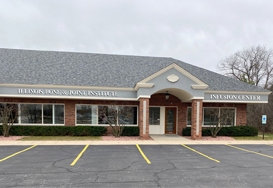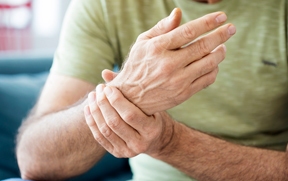Causes and Risk Factors
- Age: The risk increases as you get older.
- Gender: Women are more likely to develop osteoporosis than men.
- Family History: A family history of osteoporosis or bone fractures
- Body Frame Size: Individuals with smaller body frames tend to have a higher risk because they might have less bone mass to draw from as they age.
- Hormonal Levels: Decreased sex hormones, especially reduced estrogen levels in women after menopause, can lead to weaker bones.
- Dietary Factors: Low calcium intake, eating disorders, and gastrointestinal surgery can affect the body’s ability to absorb calcium.
- Lifestyle Choices: Sedentary lifestyle, excessive alcohol consumption, and tobacco use
Symptoms
In most cases, there may be no symptoms.
- Back pain, caused by a fractured or collapsed vertebra
- Loss of height over time
- A stooped posture
- Bone fractures that occur more easily than expected
Treatments
The treatment of osteoporosis focuses on slowing down or halting the mineral loss of bones, increasing bone density, preventing bone fractures, and managing pain associated with the disease. This multifaceted approach can include oral, subcutaneous and infusion medications (such as Prolia, Evenity, Reclast, Boniva IV). Lifestyle modifications and dietary changes can also strengthen bones and improve overall bone health. With advances in medical science, there are now more options than ever to manage and treat osteoporosis effectively, offering hope and improved outcomes for patients.
Medications
- Antiresorptive Agents (Biphosphonates, Prolia): Used in both men and women at increased risk of fracture
- Anabolic Agents (Evenity, Forteo, Tymlos): Help increase bone formation
- Hormone-related Therapy: Estrogen, especially when started soon after menopause, can help maintain bone density.
Lifestyle Changes
- Diet: A diet rich in calcium and vitamin D is crucial for bone health.
- Exercise: Weight-bearing and muscle-strengthening exercises can improve bone density and prevent bone loss.
- Fall Prevention: Reducing the risk of falls can prevent fractures.
Supplements
- Calcium and Vitamin D supplements are important to improve bone health.
Frequently Asked Questions
Can osteoporosis be cured?
While there is no cure for osteoporosis, treatments are available that can help reduce the risk of fractures and slow the progression of the disease and build your bones.
At what age should I be concerned about osteoporosis?
Osteoporosis is more common in older adults, but it's important to start bone health prevention strategies early in life. Screening is generally recommended for women aged 65 and older and men aged 70 and older, but those with risk factors may need to be screened earlier.
Isn't osteoporosis only a concern for women?
While women are at a higher risk, especially after menopause, men also face a significant risk of developing osteoporosis, particularly in their later years.
How is osteoporosis diagnosed?
Osteoporosis is most often diagnosed by a bone density test, usually a dual-energy x-ray absorptiometry (DXA) scan, which measures bone mineral density (BMD).






